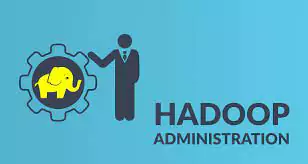Course Curriculum
Course Content
- Overview of Big Data concepts and challenges.
- Introduction to Hadoop ecosystem and its components.
- Understanding the core components of Hadoop architecture: HDFS (Hadoop Distributed File System) and YARN (Yet Another Resource Negotiator).
- Learning about data locality, data replication, and fault tolerance.
- Setting up a single-node Hadoop cluster for learning purposes.
- Installing Hadoop on a multi-node cluster.
- Configuring Hadoop daemons (NameNode, DataNode, ResourceManager, NodeManager) for optimal performance.
- Tuning Hadoop configuration parameters.
- Understanding HDFS architecture and data storage.
- Managing HDFS permissions, quotas, and access controls.
- Monitoring cluster health and performance using Hadoop metrics and monitoring tools.
- Managing cluster resources and capacity.
- Importing data into Hadoop using tools like Sqoop and Flume.
- Processing data using MapReduce and YARN.
- Implementing security measures for Hadoop clusters.
- Configuring Kerberos authentication and encryption.
- Implementing backup and recovery strategies for Hadoop data.
- Performing regular backups of HDFS and metadata.
- Overview of tools like Hive, Pig, HBase, and Spark in the Hadoop ecosystem.
- Understanding their administration and management.
- Adding and removing nodes from a Hadoop cluster.
- Horizontal and vertical scaling considerations.
- Configuring NameNode High Availability (HA) for improved cluster reliability.
- Handling failover scenarios.
- Identifying and resolving common issues in Hadoop clusters.
- Performance tuning techniques for optimal resource utilization.
- Upgrading Hadoop versions and managing software patches.
- Performing cluster maintenance tasks.
- Exploring real-world scenarios and case studies in Hadoop administration.
- Implementing best practices for successful Hadoop cluster management.
- Hands-on exercises and a final project that involve setting up and managing a Hadoop cluster.
- Practical experience in troubleshooting, performance tuning, and cluster optimization.
Quick Enquiry
Exam & Certification
After completing the Hadoop Administrator training program, you will need to submit your project to the trainer. On satisfactory completion of the course requirements and project work, you will receive a signed certificate of completion. While this certificate serves as a validation of your skills, its your immediately demonstrable Hadoop administrator skills that will truly differentiate you.
Testimonials
Hadoop FAQ's
Hadoop Administration Certification Training is a specialized program designed to equip individuals with the skills and knowledge needed to manage and administer Hadoop clusters effectively. It covers topics such as installation, configuration, maintenance, security, and performance optimization.
The training is suitable for IT professionals, system administrators, database administrators, and anyone interested in managing and maintaining Hadoop clusters. Its particularly valuable for individuals working with Big Data and seeking to enhance their skills in Hadoop administration.
Participants will learn how to install, configure, monitor, maintain, and troubleshoot Hadoop clusters. The training covers topics such as HDFS management, cluster configuration, security, backup and recovery, performance tuning, and more.
Some familiarity with Linux/Unix operating systems, general IT concepts, and a basic understanding of Big Data concepts can be helpful. However, many training programs are designed to accommodate beginners, and they often start with foundational topics.
After completing the training, participants may receive a certificate of completion from the training provider. However, there is not a standardized "Hadoop Administration Certification" like some other IT certifications. The training itself is more focused on building practical skills.
The duration of the training can vary. Its commonly offered as a multi-day course, often spanning 3 to 5 days, depending on the depth and coverage of the curriculum.

.webp)
.webp)


